- Home
- George Eliot
Scenes of Clerical Life Page 3
Scenes of Clerical Life Read online
Page 3
"Did the Farquhars say anything about the singing last Sunday?"
"Yes; Farquhar said he thought it was time there was some improvement in the
choir. But he was rather scandalised at my setting the tune of 'Lydia.' He says
he's always hearing it as he passes the Independent meeting." Here Mr Barton
laughed�he had a way of laughing at criticisms that other people thought
damaging�and thereby showed the remainder of a set of teeth which, like the
remnants of the Old Guard, were few in number, and very much the worse for wear.
"But," he continued, "Mrs Farquhar talked the most about Mr Bridmain and the
Countess. She has taken up all the gossip about them, and wanted to convert me
to her opinion, but I told her pretty strongly what I thought."
"Dear me! why will people take so much pains to find out evil about others? I
have had a note from the Countess since you went, asking us to dine with them on
Friday."
Here Mrs Barton reached the note from the mantelpiece, and gave it to her
husband. We will look over his shoulder while he reads it:�
"Sweetest Milly,�Bring your lovely face with your husband to dine with us on
Friday at seven�do. If not, I will be sulky with you till Sunday, when I shall
be obliged to see you, and shall long to kiss you that very moment.�Yours,
according to your answer,
"Caroline Czerlaski."
"Just like her, isn't it?" said Mrs Barton. "I suppose we can go?"
"Yes; I have no engagement. The Clerical Meeting is to-morrow, you know."
"And, dear, Woods the butcher called, to say he must have some money next week.
He has a payment to make up."
This announcement made Mr Barton thoughtful. He puffed more rapidly, and looked
at the fire.
"I think I must ask Hackit to lend me twenty pounds, for it is nearly two months
till Lady-day, and we can't give Woods our last shilling."
"I hardly like you to ask Mr Hackit, dear�he and Mrs Hackit have been so very
kind to us; they have sent us so many things lately."
"Then I must ask Oldinport. I'm going to write to him to-morrow morning, for to
tell him the arrangement I've been thinking of about having service in the
workhouse while the church is being enlarged. If he agrees to attend service
there once or twice, the other people will come. Net the large fish, and you're
sure to have the small fry."
"I wish we could do without borrowing money, and yet I don't see how we can.
Poor Fred must have some new shoes; I couldn't let him go to Mrs Bond's
yesterday because his toes were peeping out, dear child! and I can't let him
walk anywhere except in the garden. He must have a pair before Sunday. Really,
boots and shoes are the greatest trouble of my life. Everything else one can
turn and turn about, and make old look like new; but there's no coaxing boots
and shoes to look better than they are."
Mrs Barton was playfully undervaluing her skill in metamorphosing boots and
shoes. She had at that moment on her feet a pair of slippers which had long ago
lived through the prunella phase of their existence, and were now running a
respectable career as black silk slippers, having been neatly covered with that
material by Mrs Barton's own neat fingers. Wonderful fingers those! they were
never empty; for if she went to spend a few hours with a friendly parishioner,
out came her thimble and a piece of calico or muslin, which, before she left,
had become a mysterious little garment with all sorts of hemmed ins and outs.
She was even trying to persuade her husband to leave off tight pantaloons,
because if he would wear the ordinary gun-cases, she knew she could make them so
well that no one would suspect the sex of the tailor.
But by this time Mr Barton has finished his pipe, the candle begins to burn low,
and Mrs Barton goes to see if Nanny has succeeded in lulling Walter to sleep.
Nanny is that moment putting him in the little cot by his mother's bedside; the
head, with its thin wavelets of brown hair, indents the little pillow; and a
tiny, waxen, dimpled fist hides the rosy lips, for baby is given to the
infantine peccadillo of thumb-sucking.
So Nanny could now join in the short evening prayer, and all could go to bed.
Mrs Barton carried up-stairs the remainder of her heap of stockings, and laid
them on a table close to her bedside, where also she placed a warm shawl,
removing her candle, before she put it out, to a tin socket fixed at the head of
her bed. Her body was very weary, but her heart was not heavy, in spite of Mr
Woods the butcher, and the transitory nature of shoe-leather; for her heart so
overflowed with love, she felt sure she was near a fountain of love that would
care for husband and babes better than she could foresee; so she was soon
asleep. But about half-past five o'clock in the morning, if there were any
angels watching round her bed�and angels might be glad of such an office� they
saw Mrs Barton rise up quietly, careful not to disturb the slumbering Amos, who
was snoring the snore of the just, light her candle, prop herself upright with
the pillows, throw the warm shawl round her shoulders, and renew her attack on
the heap of undarned stockings. She darned away until she heard Nanny stirring,
and then drowsiness came with the dawn; the candle was put out, and she sank
into a doze. But at nine o'clock she was at the breakfast-table, busy cutting
bread-and-butter for five hungry mouths, while Nanny, baby on one arm, in rosy
cheeks, fat neck, and nightgown, brought in a jug of hot milk-and-water. Nearest
her mother sits the nine-year-old Patty, the eldest child, whose sweet fair face
is already rather grave sometimes, and who always wants to run up-stairs to save
mamma's legs, which get so tired of an evening. Then there are four other blond
heads�two boys and two girls, gradually decreasing in size down to Chubby, who
is making a round O of her mouth to receive a bit of papa's "baton." Papa's
attention was divided between petting Chubby, rebuking the noisy Fred, which he
did with a somewhat excessive sharpness, and eating his own breakfast. He had
not yet looked at Mamma, and did not know that her cheek was paler than usual.
But Patty whispered, "Mamma, have you the headache?"
Happily, coal was cheap in the neighbourhood of Shepperton, and Mr Hackit would
any time let his horses draw a load for "the parson" without charge; so there
was a blazing fire in the sitting-room, and not without need, for the vicarage
garden, as they looked out on it from the bow window, was hard with black frost,
and the sky had the white woolly look that portends snow.
Breakfast over, Mr Barton mounted to his study, and occupied himself in the
first place with his letter to Mr Oldinport. It was very much the same sort of
letter as most clergymen would have written under the same circumstances, except
that instead of perambulate, the Rev. Amos wrote preambulate, and instead of "if
haply," "if happily," the contingency indicated being the reverse of happy. Mr
Barton had not the gift of perfect accuracy in English orthography and syntax;
which was unfortunate, as he was known not to be a Hebrew scholar, and not in
the least suspected of being an accomplished Grecian. These lapses, in a man who
had gone through the Eleusinian mysteries of a university education, surprised
the young ladies of his parish extremely; especially the Misses Farquhar, whom
he had once addressed in a letter as Dear Mads., apparently an abbreviation for
Madams. The persons least surprised at the Rev. Amos's deficiencies were his
clerical brethren, who had gone through the mysteries themselves.
At eleven o'clock, Mr Barton walked forth in cape and boa, with the sleet
driving in his face, to read prayers at the workhouse, euphuistically called the
"College." The College was a huge square stone building, standing on the best
apology for an elevation of ground that could be seen for about ten miles round
Shepperton. A flat ugly district this; depressing enough to look at, even on the
brightest days. The roads are black with coal-dust, the brick houses dingy with
smoke; and at that time�the time of handloom weavers� every other cottage had a
loom at its window, where you might see a pale, sickly-looking man or woman
pressing a narrow chest against a board, and doing a sort of tread-mill work
with legs and arms. A troublesome district for a clergyman; at least to one who,
like Amos Barton, understood the "cure of souls" in something more than an
official sense; for over and above the rustic stupidity furnished by the
farm-labourers, the miners brought obstreperous animalism, and the weavers an
acrid Radicalism and Dissent. Indeed, Mrs Hackit often observed that the
colliers, who many of them earned better wages than Mr Barton, "passed their
time in doing nothing but swilling ale and smoking, like the beasts that perish"
(speaking, we may presume, in a remotely analogical sense); and in some of the
alehouse corners the drink was flavoured by a dingy kind of infidelity,
something like rinsings of Tom Paine in ditchwater. A certain amount of
religious excitement, created by the popular preaching of Mr Parry, Amos's
predecessor, had nearly died out, and the religious life of Shepperton was
falling back towards low-water mark. Here, you perceive, was a terrible
stronghold of Satan; and you may well pity the Rev. Amos Barton, who had to
stand single-handed and summon it to surrender. We read, indeed, that the walls
of Jericho fell down before the sound of trumpets; but we nowhere hear that
those trumpets were hoarse and feeble. Doubtless they were trumpets that gave
forth clear ringing tones, and sent a mighty vibration through brick and mortar.
But the oratory of the Rev. Amos resembled rather a Belgian railway-horn, which
shows praiseworthy intentions inadequately fulfilled. He often missed the right
note both in public and private exhortation, and got a little angry in
consequence. For though Amos thought himself strong, he did not feel himself
strong. Nature had given him the opinion, but not the sensation. Without that
opinion he would probably never have worn cambric bands, but would have been an
excellent cabinetmaker and deacon of an Independent church, as his father was
before him (he was not a shoemaker, as Mr Pilgrim had reported). He might then
have sniffed long and loud in the corner of his pew in Gun Street chapel; he
might have indulged in halting rhetoric at prayer-meetings, and have spoken
faulty English in private life; and these little infirmities would not have
prevented him, honest faithful man that he was, from being a shining light in
the dissenting circle of Bridgeport. A tallow dip, of the long-eight
description, is an excellent thing in the kitchen candlestick, and Betty's nose
and eye are not sensitive to the difference between it and the finest wax; it is
only when you stick it in the silver candlestick, and introduce it into the
drawing-room, that it seems plebeian, dim, and ineffectual. Alas for the worthy
man who, like that candle, gets himself into the wrong place! It is only the
very largest souls who will be able to appreciate and pity him�who will discern
and love sincerity of purpose amid all the bungling feebleness of achievement.
But now Amos Barton has made his way through the sleet as far as the College,
has thrown off his hat, cape, and boa, and is reading, in the dreary
stone-floored dining-room, a portion of the morning service to the inmates
seated on the benches before him. Remember, the New Poor-law had not yet come
into operation, and Mr Barton was not acting as paid chaplain of the Union, but
as the pastor who had the cure of all souls in his parish, pauper as well as
other. After the prayers he always addressed to them a short discourse on some
subject suggested by the lesson for the day, striving if by this means some
edifying matter might find its way into the pauper mind and conscience �perhaps
a task as trying as you could well imagine to the faith and patience of any
honest clergyman. For, on the very first bench, these were the faces on which
his eye had to rest, watching whether there was any stirring under the stagnant
surface.
Right in front of him�probably because he was stone-deaf, and it was deemed more
edifying to hear nothing at a short distance than at a long one �sat "Old
Maxum," as he was familiarly called, his real patronymic remaining a mystery to
most persons. A fine philological sense discerns in this cognomen an indication
that the pauper patriarch had once been considered pithy and sententious in his
speech; but now the weight of ninety-five years lay heavy on his tongue as well
as in his ears, and he sat before the clergyman with protruded chin, and
munching mouth, and eyes that seemed to look at emptiness.
Next to him sat Poll Fodge�known to the magistracy of her country as Mary
Higgins�a one-eyed woman, with a scarred and seamy face, the most notorious
rebel in the workhouse, said to have once thrown her broth over the master's
coat-tails, and who, in spite of nature's apparent safeguards against that
contingency, had contributed to the perpetuation of the Fodge characteristics in
the person of a small boy, who was behaving naughtily on one of the back
benches. Miss Fodge fixed her one sore eye on Mr Barton with a sort of hardy
defiance.
Beyond this member of the softer sex, at the end of the bench, sat "Silly Jim,"
a young man afflicted with hydrocephalus, who rolled his head from side to side,
and gazed at the point of his nose. These were the supporters of Old Maxum on
his right.
On his left sat Mr Fitchett, a tall fellow, who had once been a footman in the
Oldinport family, and in that giddy elevation had enunciated a contemptuous
opinion of boiled beef, which had been traditionally handed down in Shepperton
as the direct cause of his ultimate reduction to pauper commons. His calves were
now shrunken, and his hair was grey without the aid of powder; but he still
carried his chin as if he were conscious of a stiff cravat; he set his
dilapidated hat on with a knowing inclination towards the left ear; and when he
was on field-work, he carted and uncarted the manure with a sort of flunkey
grace, the ghost of that jaunty demeanour with which he used to
usher in my
lady's morning visitors. The flunkey nature was nowhere completely subdued but
in his stomach, and he still divided society into gentry, gentry's flunkeys, and
the people who provided for them. A clergyman without a flunkey was an anomaly,
belonging to neither of these classes. Mr Fitchett had an irrepressible tendency
to drowsiness under spiritual instruction, and in the recurrent regularity with
which he dozed off until he nodded and awaked himself, he looked not unlike a
piece of mechanism, ingeniously contrived for measuring the length of Mr
Barton's discourse.
Perfectly wide-awake, on the contrary, was his left-hand neighbour, Mrs Brick,
one of those hard undying old women, to whom age seems to have given a network
of wrinkles, as a coat of magic armour against the attacks of winters, warm or
cold. The point on which Mrs Brick was still sensitive�the theme on which you
might possibly excite her hope and fear�was snuff. It seemed to be an enbalming
powder, helping her soul to do the office of salt.
And now, eke out an audience of which this front benchful was a sample, with a
certain number of refractory children, over whom Mr Spratt, the master of the
workhouse, exercised an irate surveillance, and I think you will admit that the
university-taught clergyman, whose office it is to bring home the gospel to a
handful of such souls, has a sufficiently hard task. For, to have any chance of
success, short of miraculous intervention, he must bring his geographical,
chronological, exegetical mind pretty nearly to the pauper point of view, or of
no view; he must have some approximate conception of the mode in which the
doctrines that have so much vitality in the plenum of his own brain will comport
themselves in vacuo �that is to say, in a brain that is neither geographical,
chronological, nor exegetical. It is a flexible imagination that can take such a
leap as that, and an adroit tongue that can adapt its speech to so unfamiliar a
position. The Rev. Amos Barton had neither that flexible imagination, nor that
adroit tongue. He talked of Israel and its sins, of chosen vessels, of the
Paschal lamb, of blood as a medium of reconciliation; and he strove in this way
to convey religious truth within reach of the Fodge and Fitchett mind. This very
morning, the first lesson was the twelfth chapter of Exodus, and Mr Barton's
exposition turned on unleavened bread. Nothing in the world more suited to the
simple understanding than instruction through familiar types and symbols! But
there is always this danger attending it, that the interest or comprehension of
your hearers may stop short precisely at the point where your spiritual
interpretation begins. And Mr Barton this morning succeeded in carrying the
pauper imagination to the dough-tub, but unfortunately was not able to carry it
upwards from that well-known object to the unknown truths which it was intended
to shadow forth.
Alas! a natural incapacity for teaching, finished by keeping "terms" at
Cambridge, where there are able mathematicians, and butter is sold by the yard,
is not apparently the medium through which Christian doctrine will distil as
welcome dew on withered souls.
And so, while the sleet outside was turning to unquestionable snow, and the
stony dining-room looked darker and drearier, and Mr Fitchett was nodding his
lowest, and Mr Spratt was boxing the boys' ears with a constant rinforzando, as
he felt more keenly the approach of dinner-time, Mr Barton wound up his
exhortation with something of the February chill at his heart as well as his
feet. Mr Fitchett, thoroughly roused now the instruction was at an end,
obsequiously and gracefully advanced to help Mr Barton in putting on his cape,
while Mrs Brick rubbed her withered forefinger round and round her little
shoe-shaped snuff-box, vainly seeking for the fraction of a pinch. I can't help

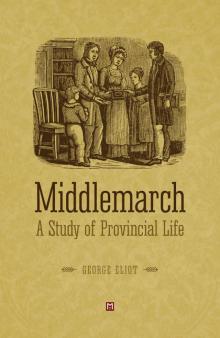 Middlemarch
Middlemarch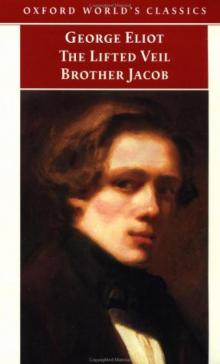 Brother Jacob
Brother Jacob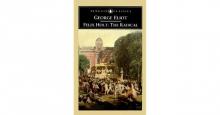 Felix Holt, the Radical
Felix Holt, the Radical Mr Gilfil's Love Story
Mr Gilfil's Love Story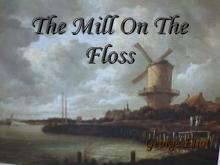 The Mill on the Floss
The Mill on the Floss Silas Marner
Silas Marner Adam Bede
Adam Bede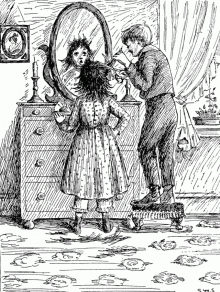 Tom and Maggie Tulliver
Tom and Maggie Tulliver The Damn Fool
The Damn Fool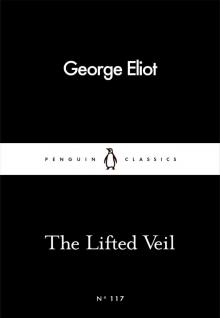 The Lifted Veil
The Lifted Veil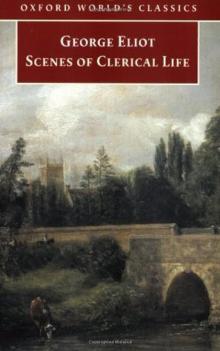 Scenes of Clerical Life
Scenes of Clerical Life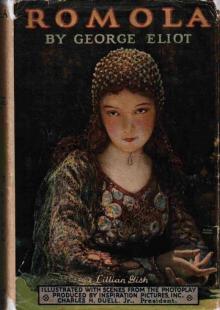 Romola
Romola Daniel Deronda
Daniel Deronda Felix Holt
Felix Holt